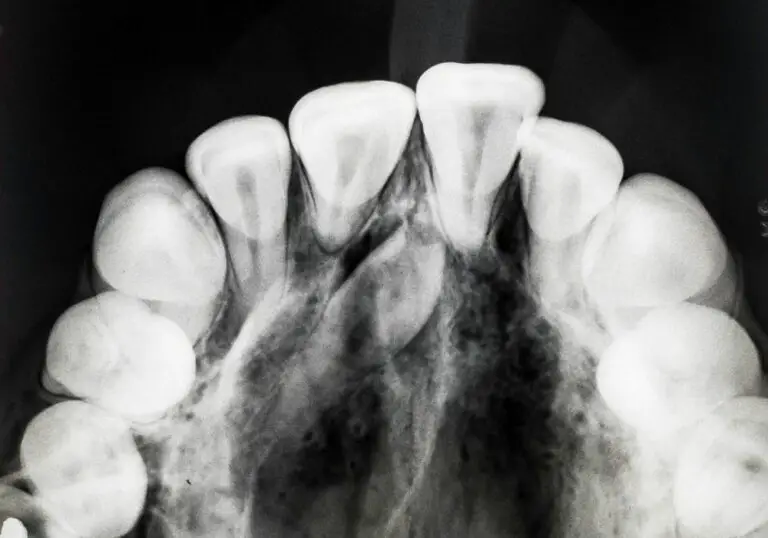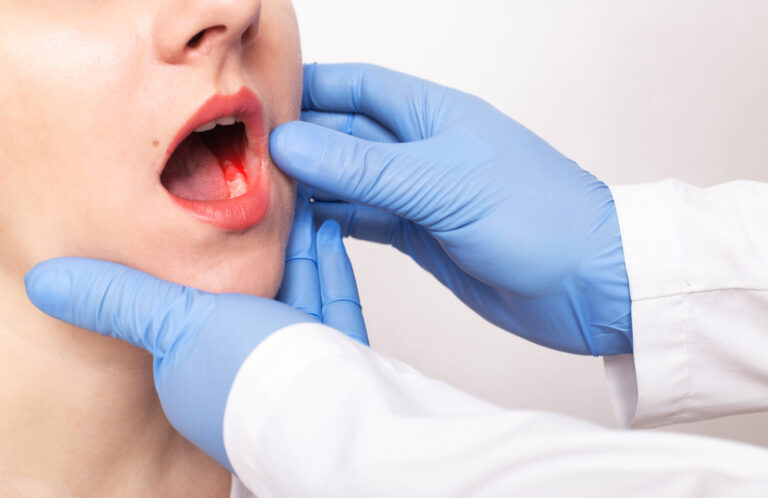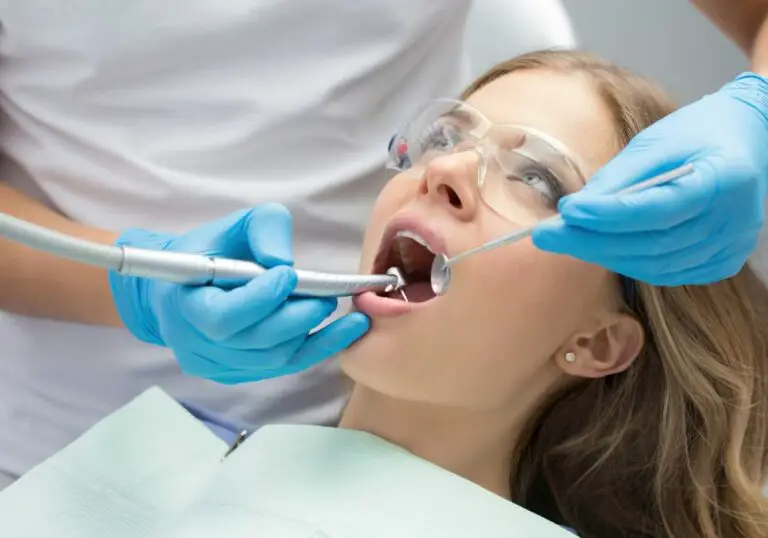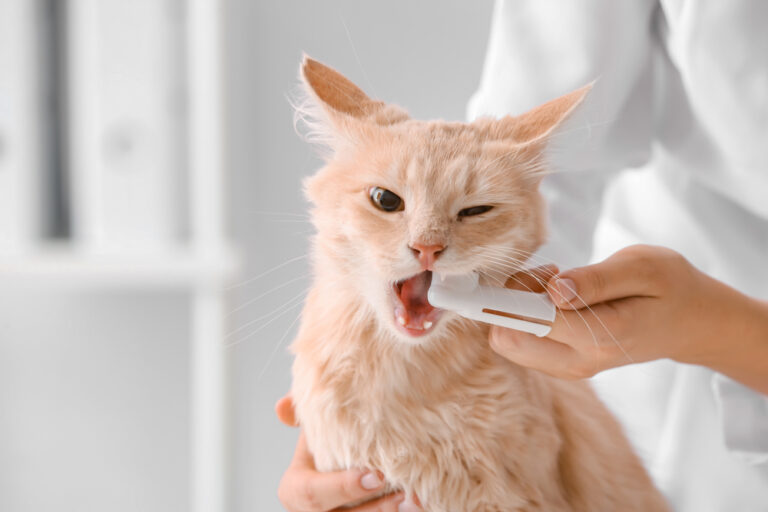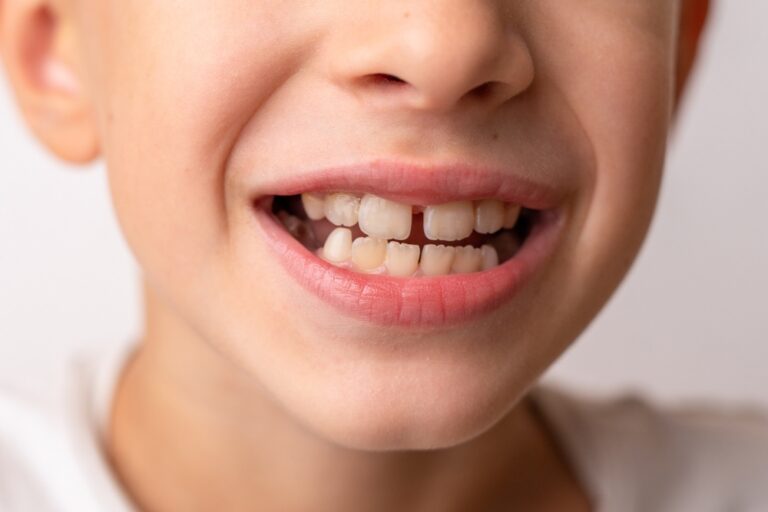Bleeding from the gums when brushing or flossing is a common complaint that affects many adults. Also called gingival bleeding, seeing spots or streaks of blood in the sink after brushing can be alarming. However, minor gum bleeding is usually not a major cause for concern. This article explores the potential reasons you may notice blood when brushing your teeth, when gum bleeding might indicate a problem, and what you can do at home and professionally to treat and prevent bleeding gums.
What Causes Bleeding Gums?

There are a number of possible causes explaining why your gums bleed during brushing:
Gingivitis
The most common cause of bleeding gums is gingivitis, which is inflammation of the gums. Gingivitis occurs as a result of plaque, a sticky film containing bacteria, building up on the teeth and gums. While some amount of plaque is normal, inadequate brushing and flossing can allow it to accumulate.
The toxins from plaque bacteria triggers immune responses in the gums, causing them to become inflamed, puffy, and more prone to bleeding. Mild gingivitis usually does not produce any pain or discomfort. In the early stages, the only symptom may be bleeding when brushing or flossing.
Gingivitis is extremely prevalent, with some research indicating 50-90% of the global population has some degree and form of gingivitis. It can affect people of any age, but hormones, medications, and other factors may increase susceptibility.
Periodontitis
Over time, untreated gingivitis can progress to periodontitis. This more advanced form of gum disease happens when inflammation spreads deeper below the gum line. The gums pull away from the teeth and form periodontal pockets, which provide an ideal environment for additional plaque growth.
As plaque expands and the infection spreads, the periodontal tissues and bone are broken down. The gums recede, pockets deepen, and teeth may loosen or shift. Bleeding is more frequent because the gum attachment to teeth is weakened.
According to the CDC, almost 50% of adults over age 30 have some signs of periodontitis, though severity varies between mild, moderate, and severe. Severe periodontitis can result in tooth loss if not treated.
Vitamin Deficiencies
Micronutrient deficiencies involving vitamins C and K are also associated with gum bleeding.
Vitamin C plays key roles in gum health, as it is needed for cellular regeneration and production of periodontal ligaments. Scurvy, the disease caused by severe vitamin C deficiency, results in spongy, swollen and bleeding gums. Lower levels of vitamin C can also impact oral health.
Vitamin K is involved in the blood clotting process. Without adequate vitamin K, blood is thinner and bleeding time is prolonged. Easy bruising and bleeding gums can be a consequence of vitamin K deficiency.
Those who are malnourished or have limited diets high in processed foods may be more prone to vitamin deficiencies that affect gum health and bleeding.
Blood Disorders
Disorders that impair the blood’s ability to form clots normally can also lead to bleeding gums with only minimal trauma.
For example, hemophilia is a genetic disorder where blood does not clot properly leading to excessive bleeding. Other disorders like idiopathic thrombocytopenic purpura (ITP) involve low platelet levels, also increasing bleeding risk.
Underlying clotting issues will likely produce other bleeding symptoms as well, such as frequent nosebleeds, bruising, bleeding from small cuts etc.
Medications
Various prescription and over-the-counter medications have bleeding as a potential side effect. Medications that make the blood less able to clot increase the likelihood of gum bleeding when brushing.
These types of medications include:
- Anticoagulants – such as warfarin and heparin, commonly used to treat stroke, heart attack, blood clots.
- Antiplatelet agents – such as clopidogrel and aspirin, used to prevent clot formation.
- Antidepressants – mainly selective serotonin reuptake inhibitors (SSRIs).
- NSAIDs – non-steroidal anti-inflammatory drugs like ibuprofen.
- Cancer treatment drugs – certain chemotherapy and immunotherapy medications.
Keeping your dentist informed about all medications you take allows them to take the bleeding risks into account.
Risk Factors For Bleeding Gums

A variety of factors can increase susceptibility to gum problems and bleeding:
- Poor oral hygiene – Not brushing and flossing thoroughly contributes to more plaque buildup.
- Improper brushing – Using a hard-bristled brush or scrubbing aggressively can irritate gums.
- Smoking/tobacco use – Chemicals in tobacco smoke promote gum inflammation.
- Genetics – Some people are just more prone to developing gum disease and issues.
- Stress – Chronic stress impacts immune function and overall health.
- Hormonal changes – Such as during puberty, menstruation, and pregnancy. Estrogen increases inflammation.
- Diabetes – High blood sugar negatively affects gum tissues and healing ability.
- Malnutrition – Deficiencies in vitamin C, vitamin K, and other nutrients impair gum health.
- HIV/AIDS – Weakened immune system increases vulnerability to infections.
- Medications – As described previously, certain drugs like anticoagulants thin blood.
Signs It May Be Time to See A Dentist
Occasional minor gum bleeding when brushing is not unusual if it resolves quickly. However, certain signs and symptoms indicate a dentist visit is in order:
- Bleeding persists longer than 2 minutes – Quickly stopping bleeding is normal. Longer duration suggests a problem.
- Bleeding happens every time you brush – Frequent bleeding likely means underlying inflammation.
- You notice blood-tinged toothpaste or saliva – Significant bleeding if not coming from an obvious cut.
- Gums are painful, sore, or very red – Inflammation and increased sensitivity.
- Gums appear swollen or puffy – An inflamed gumline.
- Gums have pulled away, exposing root surfaces – Sign of receding gums and periodontitis.
- Teeth feel loose or like they have moved – Could indicate bone and attachment loss.
- You notice pus, bad taste/breath – Symptoms of infection and abscess.
- Bleeding when eating certain foods – Gums are extremely sensitive.
Do not ignore frequent gum bleeding or associated symptoms. See a dentist promptly for an evaluation before lasting gum recession and bone damage develops. The dentist can diagnose the underlying cause and provide appropriate treatment.
Diagnosis of Gum Bleeding
A dentist can use various methods to diagnose the likely cause of bleeding gums:
- Medical history – The dentist will ask about your symptoms, duration, medications, health conditions, and other factors.
- Oral examination – Checking for visual signs of inflammation, swelling, recession, plaque deposits, etc.
- Periodontal probing – A painless procedure using a dental instrument to measure pocket depth around each tooth, assessing attachment loss.
- Dental x-rays – Radiographs allow dentists to visualize bone levels and check for damage.
- Microbiological testing – Sampling plaque for laboratory analysis can identify specific bacteria.
- Blood tests – For patients with excessive bleeding, blood tests help dentists identify any clotting disorders or platelet problems.
Based on a combination of these diagnostic findings, your dentist can determine the most likely cause of bleeding and if any treatment is indicated.
Gum Bleeding Treatment Options

Treatment varies depending on the underlying reason for bleeding gums:
Gingivitis treatment
Early gingivitis is reversed through professional dental cleanings to remove plaque from surfaces a toothbrush cannot reach. Your dentist may perform scaling to eliminate built-up calculus above and especially below the gum line.
For moderate cases, antimicrobial mouth rinses like chlorhexidine may be recommended between cleanings to kill harmful plaque bacteria. Improving daily brushing and flossing is also important.
Periodontitis treatment
Treating more advanced periodontitis involves deep cleanings, antibiotics or antimicrobials to reduce infection, and in some cases surgery to treat diseased gum tissues. After the infection is controlled, steps are taken to try regrowing bone loss from the disease.
Ongoing periodontal maintenance is required to prevent progression of periodontitis and preserve teeth over the long-term.
Nutritional and lifestyle changes
For nutritional deficiencies leading to gum bleeding, dietary changes can help increase intake of important vitamins and minerals. Your dentist may recommend supplements as well.
Quitting smoking and managing stress may also benefit your gum health and decrease bleeding risks.
Changing medications
If certain medications are contributing to excessive bleeding, your dentist will consult with your physician about potentially switching to alternatives with less bleeding risk.
However, don’t stop taking any prescribed medications without medical supervision.
Blood disorder treatment
For patients with clotting disorders or platelet abnormalities, dentists will collaborate with hematologists to control oral bleeding risks before procedures. Specific treatments may be prescribed.
At-Home Preventive Measures
While professional dental care is crucial, you can take steps at home to keep your gums healthy and reduce bleeding:
Brush properly
- Use a soft or extra-soft bristled toothbrush and avoid hard bristling. Electric brushes are also gentler.
- Brush at a 45-degree angle using gentle motions. Avoid aggressive scrubbing.
- Take your time, brushing for a full two minutes. Set a timer if needed.
Floss once daily
- Carefully insert floss between teeth, avoiding snapping down into gums. Gently rub up and down against each tooth.
- If gums bleed, it means bacteria is irritating them there. Be diligent about flossing.
Rinse daily
- Use antibacterial mouthwashes to reduce plaque bacteria between brushing.
- Warm salt water rinses can soothe inflamed gums after brushing.
Drink water
- Stay hydrated, which keeps your mouth moisturized and helps neutralize acids.
Eat a balanced diet
- Get plenty of fruits and vegetables high in vitamins C and K.
- Limit sugary foods that promote plaque.
Don’t smoke
- Avoid all tobacco products, including vaping, to protect your oral and overall health.
See your dentist
- Get professional cleanings every 6 months for a healthy mouth. See the dentist promptly if you have bleeding concerns.
When to Seek Emergency Dental Care
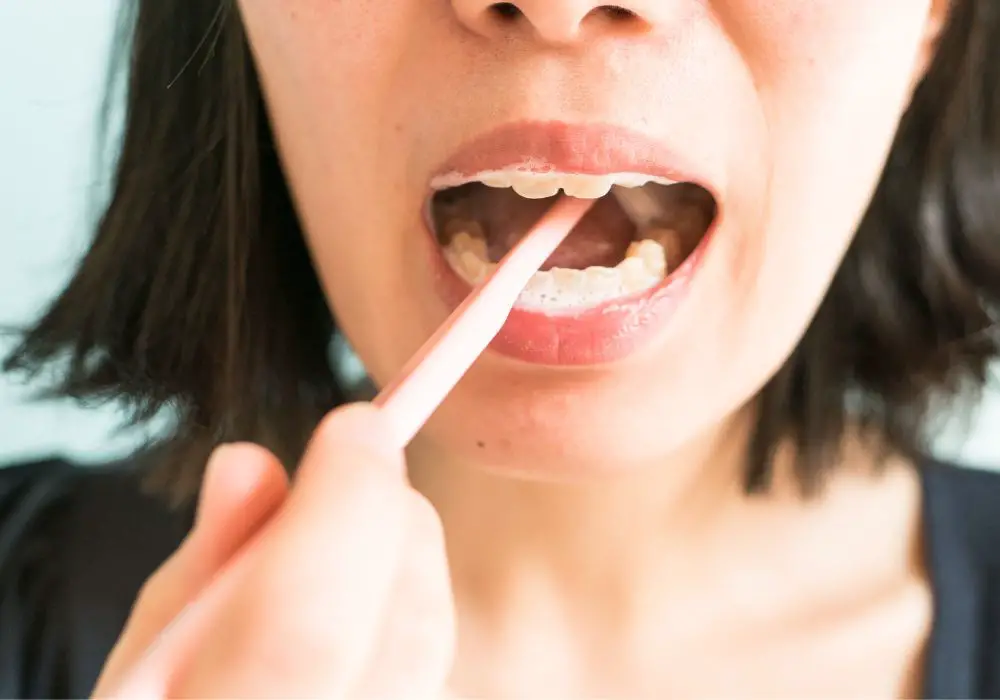
In most cases, minor blood spots from brushing don’t require an urgent dentist visit. However, you should seek emergency dental care right away if you experience:
- Bleeding lasts longer than 10-15 minutes – This signals a problem achieving hemostasis.
- Bleeding is excessive or heavy – Losing significant amounts of blood through gums.
- Unusual lesions, growths, ulcers – Potentially cancerous lesions should be urgently evaluated.
- Swelling around gums or face – Could indicate a dental abscess requiring antibiotic treatment.
- Bleeding associated with trauma – Laceration, injury, or trauma causing severe gum bleeding may need stitches.
- Difficulty breathing/swallowing – Seek immediate care if bleeding is obstructing airway.
- Severe pain – Significant toothache or mouth pain with bleeding may mean an infection needing immediate attention.
Seek prompt emergency dental assistance for uncontrolled bleeding, as well as any worrying or unusual bleeding symptoms. Swift care is critical to prevent complications.
Common Questions About Gum Bleeding
Is it normal for my gums to bleed a little with flossing?
Light bleeding when you first start flossing, especially if you don’t floss routinely, is normally not a concern. Be gentle, take your time, and the bleeding should decrease as your gums become healthier with regular flossing stimulation.
Why do my gums bleed even though I brush and floss daily?
Even with frequent brushing and flossing, it’s possible to miss some plaque deposits between teeth or below the gum line. These can still irritate gums and cause bleeding even with oral hygiene. See your dentist for a deep cleaning to remove all plaque and calculus.
Are bleeding gums more common during pregnancy?
Yes, hormonal changes during pregnancy can inflame gums and make them more prone to bleeding. Taking extra care with brushing and flossing, and seeing a dentist for cleanings, can help minimize pregnancy gingivitis.
What is the fastest way to stop bleeding gums from brushing?
Rinsing very cold water over the area for 30 seconds up to a minute can help constrict blood vessels and slow bleeding. You can also use gauze or a tea bag to apply direct pressure to the area for several minutes.
How can I tell if my gum bleeding is serious or not?
Bleeding is likely not serious if it is minor, stops within 30 seconds to a minute, and only occurs occasionally with brushing. Bleeding that is heavy, lasts several minutes, or happens frequently may indicate a dental health problem needing examination.
When to Visit Your Dentist
While a little gum bleeding with brushing now and then is fairly normal, frequent or excessive bleeding should not be ignored. See your general dentist promptly if:
- Bleeding occurs every time you brush and floss
- Gums are painful, sore, or swollen
- Bleeding does not stop within 2 minutes
- You see large amounts of blood in the sink
- Gums are receding and tooth roots are newly exposed
- You notice signs of infection like bad breath or pus
- Teeth feel loose, change position or spacing
Severe or unexplained bleeding may warrant a visit to an emergency dentist for urgent assessment.
At the dental appointment, your dentist can diagnose what is causing the bleeding and provide appropriate treatment. Leaving gum issues like gingivitis or periodontitis undiagnosed and untreated allows them to worsen over time. Prompt professional care provides the best chance of reversing damage and restoring healthy gums.
Prevention Is Key
While gum bleeding concerns should never be ignored, a bit of blood from brushing here and there is usually not an emergency. Practicing excellent daily oral hygiene and having regular dental cleanings and checkups can help prevent gum problems from occurring or progressing.
Tell your dentist right away if you ever have bleeding that seems abnormal or excessive in amount. Stay vigilant about your gum health by brushing and flossing thoroughly each day. See your dentist or dental hygienist twice yearly so they can clean plaque from spots your brush can’t reach.
Healthy gums rarely bleed with gentle brushing. So if you notice gum bleeding regularly, take it as a sign to improve your oral care routine. With proper prevention and hygiene, your gums can stay healthy and problem-free.
Conclusion
Noticing a little blood when you brush or floss is fairly common and not always a major concern if it resolves quickly. Light bleeding now and then could simply mean some localized irritation. But frequent gum bleeding with brushing may be a symptom of gingivitis, vitamin deficiency, medications, or other issues.
See your dentist promptly if you have persistent or excessive bleeding, as well as for symptoms like sore, swollen or receding gums. Ignoring these signs allows early gum disease to worsen. Your dentist can determine if plaque, periodontal disease, or another condition is the source of the bleeding, and provide appropriate treatment.
While professional dental care is key, improving your oral hygiene routine and diet can also optimize gum health and minimize bleeding risks. Taking steps now leads to a brighter smile in the future.

